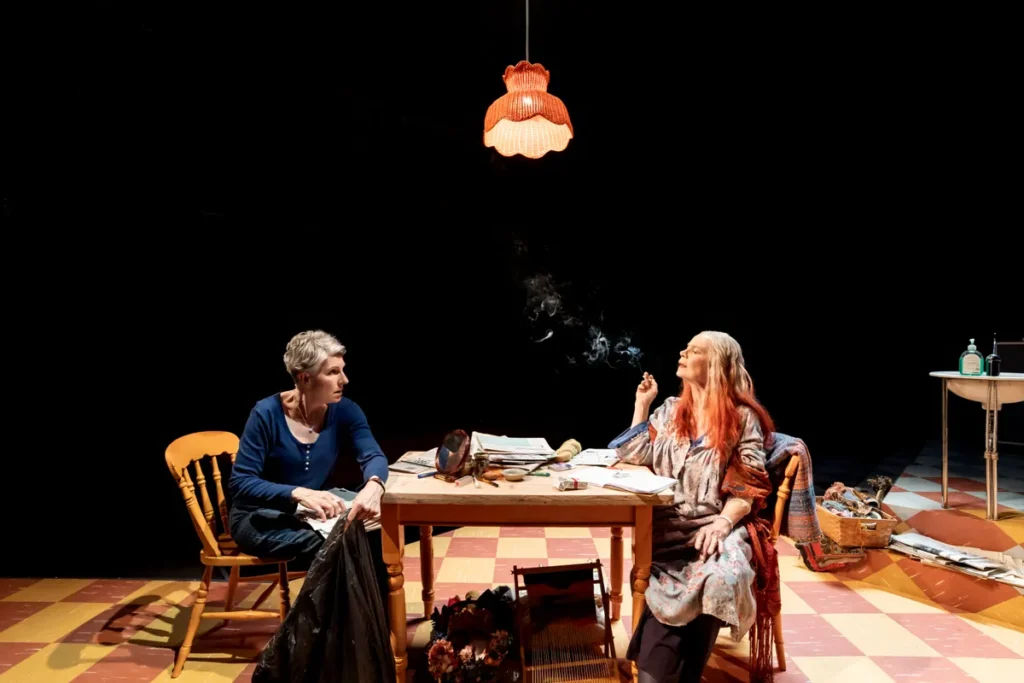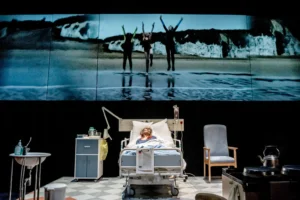Debut play prises open mother-daughter relationship
★★★★

Backstroke is a debut play receiving its premiere at the Donmar Warehouse. It’s about a daughter remembering and reassessing her relationship with her dying mother. And when this particular mother and daughter are played by Celia Imrie and Tamsin Greig, you know you’re in for a treat.
It’s not a usual occurrence to have your first play premiered at the Donmar Warehouse with Tamsin Greig and Celia Imrie as the stars. Then again, Anna Mackmin is not your usual playwright. She is steeped in theatre. Having been to acting school, she became a director and for the last twenty years has been behind some of the most memorable productions on the London stage, including Dancing At Lughnasa, The Real Thing and Hedda Gabler at the Old Vic, and Di and Viv and Rose and The Divine Mrs S at Hampstead. And who better to direct her first play than Anna Mackmin herself?
This is not her first piece of writing. Her 2018 novel Devoured, inspired by her childhood with a hippy mother, was well received. So, perhaps the first thing to say about Backstroke is that it is a beautifully written drama. It uses the stage well, it gives the actors plenty to get their teeth into, and it tells a good story as it prises open the oyster of their relationship to reveal the unexpected pearl within.
We first encounter Beth, played by Celia Imrie, in a hospital bed, symbolically at the highest, most central point of Lez Brotherston’s set. She is being visited by her daughter Bo, played by Tamsin Greig. After about ten minutes of Bo talking to her silent mother, who has had a stroke, and to the various medical staff, I began to think ‘Celia Imrie’s got an easy role’. Then we got into the nitty gritty of the drama.
Triggered by the possibly imminent death of her mother, Bo’s thoughts travel to the past. As they do, Celia Imrie slides out of bed and walks down to the front of the thrust stage, into the kitchen where so many encounters between them took place over the years. We begin to learn about the tempestuous relationship between a mother who is very needy and a daughter who is expected to cater for those needs. There is love, there is attachment, and there is conflict as the play gradually unravels their complex ties.
No mothers are perfect but Beth is self-centred, avoids intimacy, and doesn’t really want to acknowledge that she is her child’s mother (‘don’t call me mummy’) even though this would-be free spirit needs the stability and companionship of her daughter. We experience Bo’s frustration when, for example, Beth hasn’t woken her, as promised, and she will be late for her first day at college. Then we, along with Bo, realise that it’s because she doesn’t want to part with her.
Parallel to this, Bo is tied up with the challenge of being a mother herself to an adopted daughter who is finding it difficult to settle into family and school. So, she is attempting to balance the needs of her daughter, her career and her dying mother. Beth, by the way, is hundreds of miles away, which means Bo has the guilt of not being able to visit often enough, and the guilt of being away from her daughter. A feeling which I’m sure will be familiar to many in the audience.
Uplifting and heartbreaking
Part of the power of this play is Anna Mackmin’s ability to take you inside the heads of these characters. Celia Imrie’s larger-than-life Beth talks in florid language that has the effect of creating a shield to keep her daughter at bay, but often there is a look of fear behind her eyes. Tamsin Greig’s Bo develops from childhood to middle age, her enthusiasm gradually dampened, her youthful protest turning to a whine. But always there is a nervous need to understand what’s going on in her mother’s brain. She frequently pauses to process events. Used to feeling frustrated, she is almost permanently open-mouthed, but has a warm smile that refutes her inherited dislike of the intimacy of touching.

All the while, fragments of Bo’s memories of both her mother and daughter play on a large backdrop. I’m not normally a fan of mixing film with live drama but in this case the video designed by Gino Ricardo Green is highly effective in showing how memories are always with us and shape who we are.
When Beth’s brain starts to be affected by dementia, although some of the things she says are humorous, like ‘You’ve made your bed, now you can lie about it’, Bo, and we, soften in our feelings about her. Beth has never been able to help being the way she is.
The first act is a little too long but after the interval the play explodes into life. We learn that the relationship was not as one-sided as it first appeared. The episodes in their life together show us how the bond is mutual, and how Bo has much to be grateful to her mother for. When they dance together, choreographed incidentally by Anna Mackmin’s sister Scarlett, it is a joyous moment.
The ending is both uplifting and heartbreaking, as the most intimate moment between them when Bo was a child is resurrected in Beth’s last moments. A circle has been completed and, in an epilogue, Bo speaks movingly of what her late mother did for her. Tamsin Greig’s emotional delivery brought a lump to my throat.
Although her mother’s mortality is what prompts Bo’s memories of her, the play also touches on the process of dying itself. There is consideration of how we treat people at the end of life. The hospital staff shows us three approaches to patients who to them have no history, and, more to the point, no memory: there is the objective indifference of Georgina Rich‘s matter-of-fact doctor to whom Beth is just another unit; a nurse Carol, given a terrific sour-mouthed performance by Lucy Briers, who tries to impose her own moral agenda on the treatment; and there’s nurse Jill, convincingly played by Anita Reynolds, who reveals the heart beneath her patronising chirpiness. Inevitably, the mainly absent Beth is frustrated that the staff don’t understand her mother’s care needs in the way she does.
This is an extraordinarily good debut play.
Backstroke can be seen at the Donmar Warehouse until 12 April 2025. Buy tickets direct from the theatre.
Paul attended a preview and paid for his ticket.
Click here to watch this review on the YouTube channel Theatre Reviews With Paul Seven